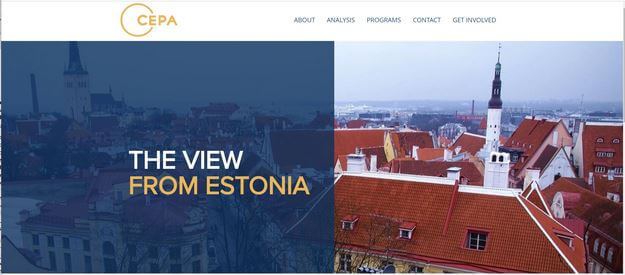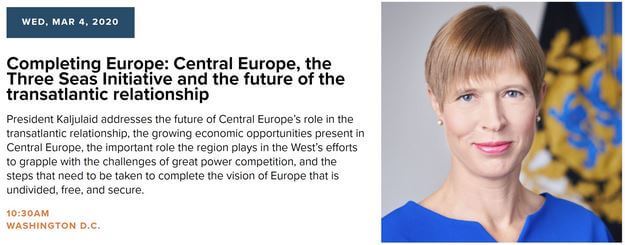
CEPA’s #CommonCrisis initiative features an Estonian perspective on COVID-19.
Social distancing has given the Estonian American National Council (EANC) a chance to catch up on the ongoing work of Washington’s think tanks on issues that are evolving along with global response to the COVID-19 virus. While in-person events have been cancelled, issues important to Estonia and the Baltic region are still being discussed online via live-streams, webcasts, phone seminars, and written reporting.
The Center for European Policy Analysis (CEPA) is “the leading research institute dedicated to the study of Central-East Europe and Russia” according to its website. Its experts have launched a new analytical series called #CommonCrisis on the implications for NATO of COVID-19. Since March 4th, CEPA’s contributors have explored many perspectives, such as the importance of cooperation, communication and responsible behavior as the long-term key to overcoming the disruptions brought on by the epidemic, and opportunities it offers for the Kremlin to advance its political goals.

The Atlantic Council hosted President Kaljulaid on March 4th.
Of particular interest is The View from Estonia by Eeva Eek-Pajuste, Director of the Lennart Meri Conference at the International Centre for Defence and Security. Her piece outlines the immediate issue of adequate testing and data, and the broader implications of Poland’s decision to close its borders, trapping Baltic citizens trying to get home. She cites parallels to the status of land links in the region in the early 1990s. New articles are added frequently and can be reviewed at cepa.org/commoncrisis. CEPA is also holding virtual events on Russian and Chinese disinformation on the pandemic, and new challenges for military mobility amid a crisis. More information on both webinars is available at cepa.org/events.
The Atlantic Council, an international affairs think tank founded in 1961, began holding its events virtually on March 16th and has so far covered topics including legislative options for deterring Russian aggression in an election year; the coronavirus’ economic impact in Europe; the recent political changes in Kyiv; and a look at Ukraine’s economy in the time of the coronavirus. Upcoming online discussion topics include the return of great power competition between the U.S., Russia, and China on March 31st. Webcasts of past events and registration to watch upcoming events live are available at atlanticcouncil.org/events.
The Wilson Center is “a United States Presidential Memorial that was established as part of the Smithsonian Institution by an act of Congress in 1968. It is also a highly recognized think tank, ranked among the top ten in the world” according to Wikipedia. It is offering phone briefings while it is closed to the public. Topics of interest include Putin’s Extended Presidency, and Russia’s Military Posture in the European Arctic. Transcripts and recordings of the calls are available at wilsoncenter.org/events.
During this unprecedented time of isolation, EANC will strive to stay on top of the issues that matter to Estonian Americans. Our Washington, DC Director will continue to monitor relevant activity in Congress and DC’s foreign policy circles and will share news and opportunities for our community members nationwide to remain informed and engaged in matters that impact U.S.-Estonian relations and Estonia’s security.
Karin Shuey
Washington, DC Director
Estonian American National Council
www.estosite.org


















